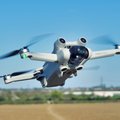(Pocket-lint) – DJI has unveiled the latest drone to join its Mavic consumer range of flying machines. It’s called the Mavic Air 2, and it’s probably the company’s most advanced consumer drone to date.
It takes on a lot of the design influences from the rest of the current Mavic range, shifting from being quite a rounded device to being more angular and pointy in places. It’s lightweight too.
At 570 grams, it’s a little heavier than the original Mavic Air, but then again, it is longer, wider and thicker too. Still, it folds up neatly making it ideal for throwing in a bag and going hiking. Just as you would expect from any Mavic series drone.
As well as being a little bigger and heavier than the original Mavic Air, the Mavic Air 2 improves virtually everything from the original model. The aim for the drone was to offer “the best overall experience possible to even the most novice pilot”.
Starting with the sensor in the camera, this time it’s a 1/2″ CMOS sensor boasting 48-megapixels. You can use all of those pixels if you want to, to create really big images or – by default – it binds four into one to create a 12-megapixel images. That’s similar to a lot of modern smartphones.
DJI has also introduced a new photo capture technology called SmartPhoto which lets you pick between three modes: HDR, Hyperlight and Scene Recognition.
HDR is pretty familiar, taking seven images at once at different exposures, and then merging them together to create a dynamic image. Hyperlight is for low light situations, using a similar technique.
There’s also scene recognition which analyses the scene to offer a bit of ‘pop’ to sunsets, grass, blue skies, snow and trees.
On the video front, the Mavic Air 2 is the first Mavic to feature 4K video capture at 60 frames per second and 120Mbps, but can also film HDR video plus either 4X slow motion (120fps) or 8X slow motion (240fps), both at 1080p resolution.
To keep things smooth, the Mavic Air 2’s camera is mounted on a three axis gimbal.
As if all that wasn’t enough, DJI has improved performance in other areas too. You get up to 34 minutes flight time from a full battery, and that’s even longer than you’ll get from the Mavic 2 Zoom or Pro.
Combined with a new controller design, OcySync 2.0 transmission can deliver an HD video feed from the drone to your connected phone up to 10km distance.
There’s also a more advanced obstacle avoidance system called APAS 3.0 which – when enabled – can create a new path around obstacles as the drone approaches them, and does so smoothly.
On the underside of the drone, DJI has equipped additional sensors and lights which help the drone land smoothly and automatically, even when light conditions aren’t ideal.
At a price of $799/£769, this may just be the company’s best value consumer drone to date. Considering the power, capabilities, battery life and the updated camera sensor, there’s a lot of drone here for that price.
squirrel_widget_236097
Writing by Cam Bunton.


